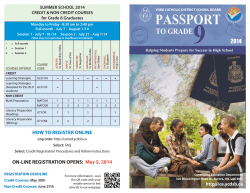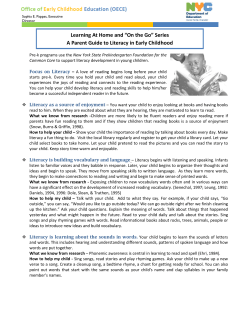
S unrise Health Service Aboriginal Corporation Katherine NT
Sunrise Health Service Aboriginal Corporation Katherine NT GOLDFIELDS EAR HEALTH CONFERENCE Kalgoorlie 30th April – 1st May 2009 E bin Tork, E bin Lern Learning to Talk,Talking to Learn The Program Fred McCONNEL & Robin McCONNEL NORTHERN TERRITORY Local Government Areas Darwin Katherine Roper Gulf Shire SUNRISE HEALTH SERVICE Operational area Bulman Werenbun Menyallaluk Katherine Wugularr Barunga Ngukurr Jilkminggan Urapunga Mataranka Minyerri Area 112.000 sq km Population 3,500 AURAL HEALTH PROGRAM •DALYs, burden of ear disease, •‘Ear Disease related disability’ •Commencement – from Coordinated Care Trial 2002 •Funded by Honda Foundation – through Fred Hollows foundation •Program Outline •Coordinator – role •Evaluation EARLY START PROJECT Ian Thorpe’s Fountain for Youth – Literacy Empowerment Project •Early Start Project – October 2005 •Literacy, books and toys, community engagement •Women’s Centres •Health focus •Coordinator, position requirements •CBW, 3 communities (top road) •Child minding service – book and toy monitors NTER – the INTERVENTION July 2007 Disclaimer Phase 1 •Child Health Checks •In house •Ear examinations / accuracy •Prevalence – AIHW •Use of data NTER – PHASE 2 Follow up •Sunrise Follow-up system (in house) •Reviews, referrals •The Government review process •Audiology, hearing hats •School programs •Effect on Aural Health Program PHASE 3 – EHSDI Enhanced Health Service Delivery Initiative •Expanded Aural Health Program •To incorporate Early Start •From September 2008 •Public health approach – prevention of disability EXPANDED AURAL HEALTH PROGRAM •Standard focus on primary prevention of ear disease •Secondary prevention of disability from ear disease •Tertiary – rehabilitation – prevention of deterioration •Frustration! •New focus – primary prevention of disability •Community-wide program •No harmful effects •Early Words E bin Tork, E bin Lern Learning to Talk, Talking to Learn The LiTTLe Program • Community-wide • Spoken language program • Home language Method - 1 •Piggy back METHOD – 2 •Coordinator / consultant •Coordinators/facilitators •Community Based Workers in clinic teams •Training •0ngoing supervision and development •Monitoring and assessment METHOD – 3 Language based activities •In the Community oWomen’s Centres – nutrition activities oPhysical Activity / sports and recreation – dads and kids oParenting and Family Support •In Health Centres oAntenatal & Postnatal, Immunisation, waiting rooms, specialists visits, Aural Health program METHOD – 4 •Spoken Language in other programs •Compatibility with LiTTLe Program •Alliances and cooperation MONITORING AND EVALUATION Monitoring / Feedback / Training •Spoken language transcripts/videos Evaluation •School entry language assessment •I-AEDI •Benchmarks References • Zhao Y, Guthridge S, Magnus A, Vos T. Burden of disease and injury in Aboriginal and non-Aboriginal • populations in the Northern Territory. MJA 180 May 2004. 498-502 • Schwab RG, Sutherland D. Literacy for Life: a scoping study for a Literacy Empowerment Study. ANU 2004 • Progress of the Northern Territory Emergency Response Child Health Check Initiative: Australian Institute of Health and Welfare, Canberra Dec 2008 at http://www.aihw.gov.au/publications/ihw/pnterchci/pnterchci.pdf accessed 22 April 2009 • Morris PS, et al. Otitis media in young Aboriginal children from remote communities in Northern and Central Australia: a cross-sectional survey. BMC Pediatrics; 2005, 5(27): • Early words - A Western Sydney Aboriginal Early Literacy Project for Families. at http://www.earlywords.info/aboriginal/index.html . accessed 12 Sept 2008 • Communities for Children http://www.facsia.gov.au/internet/facsinternet.nsf/aboutfacs/programs/sfsccommunities_for_children.htm accessed march 2009 • I-AEDI Adaptation Study http://www.rch.org.au/australianedi/com.cfm?doc_id=12429 accessed March 2009
© Copyright 2025





















